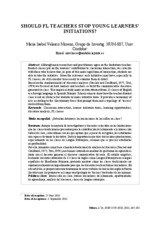| dc.contributor.author | Velasco Moreno, Mª Isabel | |
| dc.date.accessioned | 2015-08-27T08:07:29Z | |
| dc.date.available | 2015-08-27T08:07:29Z | |
| dc.date.issued | 2013 | |
| dc.identifier.issn | 1578-3820 | |
| dc.identifier.uri | http://hdl.handle.net/10396/12892 | |
| dc.description.abstract | Abstract: Although most researchers and practitioners agree on the limitations teacherfronted
classes put on the learners’ contribution to classroom interaction, we coincide
with those who believe that, in spite of this more rigid form of interaction, students are
able to take the initiative. Given the relevance such initiatives may have, especially in
FL classes, we still consider it necessary to examine them in detail.
Based on the standard model of discourse analysis (Sinclair and Coulthard, 1975; Tsui,
1994) we focused on how learners and teachers co-build the communicative discourse
generated in class. This empirical study made on data obtained from 12 classes of English
as a foreign language in Spanish Primary Schools aims to show how the teacher-fronted
class is not an obstacle for students to make initiative turns. It provides a taxonomy of
acts according to the illocutionary force that prompt them and a typology of ‘incises’
derived from them. | es_ES |
| dc.format.mimetype | application/pdf | es_ES |
| dc.language.iso | eng | es_ES |
| dc.publisher | Universidad de Almería | es_ES |
| dc.rights | https://creativecommons.org/licenses/by-nc-nd/4.0/ | es_ES |
| dc.source | Odisea 14, 167-182 (2013) | es_ES |
| dc.subject | Classroom interaction | es_ES |
| dc.subject | Learner initiation turns | es_ES |
| dc.subject | Learning opportunities | es_ES |
| dc.subject | Discourse analysis | es_ES |
| dc.subject | FL classes | es_ES |
| dc.title | Should fl teachers stop young learners’ initiations? | es_ES |
| dc.type | info:eu-repo/semantics/article | es_ES |
| dc.rights.accessRights | info:eu-repo/semantics/openAccess | es_ES |

